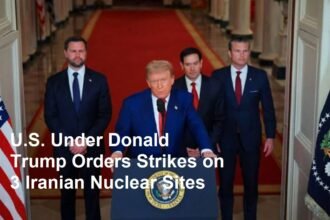In a recent diplomatic statement, the Chinese government expressed strong disapproval of the unilateral sanctions imposed by the European Union (EU) and the United Kingdom (UK) on Russia and several Chinese companies. These sanctions are linked to Russia’s President Vladimir Putin’s refusal to agree to a ceasefire in the ongoing conflict with Ukraine. China’s response highlights the growing tensions in international relations and underscores Beijing’s stance on sovereignty, multilateralism, and economic cooperation.
Understanding the Context of the Sanctions
The EU and UK sanctions target Russian entities and Chinese companies believed to be associated with Russia’s military and political strategies, particularly those connected to President Putin’s decision to continue hostilities in Ukraine. These measures include asset freezes, trade restrictions, and limitations on financial transactions aimed at pressuring Russia to halt its military operations.
China’s government, however, views these sanctions as unjust and counterproductive. Officials argue that such unilateral actions undermine international law and the principles of sovereign equality. Beijing insists that sanctions should be the result of collective decisions through international institutions like the United Nations, rather than imposed unilaterally by individual blocs or countries.
China’s Official Position and Diplomatic Response
In an official statement, China’s Ministry of Foreign Affairs condemned the sanctions as “unilateral and illegal,” emphasizing that they harm not only the targeted countries but also global economic stability. The statement stressed China’s commitment to peaceful dialogue and negotiation as the only viable path to resolving the Ukraine conflict.
“China calls on all parties to respect sovereignty and territorial integrity and to engage in constructive dialogue,” said a spokesperson for the ministry. “We oppose any sanctions that are imposed without broad international consensus and that disrupt global supply chains and economic cooperation.”
This position aligns with China’s broader foreign policy principles, which prioritize non-interference, respect for sovereignty, and multilateralism. Beijing’s stance also reflects its strategic interest in maintaining strong economic ties with both Russia and the European markets.
Economic and Geopolitical Implications
The sanctions have significant implications for global trade and economic relations. Chinese companies targeted by the EU and UK sanctions face operational challenges, including restricted access to European financial systems and markets. This situation complicates China’s role as a major global trade partner and investor.
Moreover, China’s vocal opposition to the sanctions signals a potential shift in geopolitical alliances. By defending Russia and its own companies, China positions itself as a counterbalance to Western influence, advocating for a multipolar world order where emerging economies have greater say in global governance.
Expert Insights and Credibility
Dr. Li Wei, a senior fellow at the China Institute of International Studies, commented, “China’s condemnation of these sanctions is consistent with its long-standing policy of opposing unilateral coercive measures. Beijing seeks to promote dialogue and peaceful resolution, while protecting its economic interests and strategic partnerships.”
International law experts also note that unilateral sanctions often face criticism for bypassing established global mechanisms. Professor Anna Müller of the European University Institute stated, “While sanctions are a tool of foreign policy, their legitimacy depends on multilateral approval. China’s objections highlight the ongoing debate about the effectiveness and fairness of such measures.”
What This Means for the Future
China’s response to the EU and UK sanctions underscores the complexities of the Ukraine conflict and the broader geopolitical landscape. It reflects the challenges of balancing national interests, international law, and global economic stability.
As tensions persist, the international community faces pressure to find inclusive solutions that respect sovereignty and promote peace. China’s call for multilateralism and dialogue may influence future diplomatic efforts and economic policies.
Conclusion
China’s strong condemnation of the EU and UK’s unilateral sanctions against Russia and Chinese companies linked to President Putin’s stance on Ukraine highlights a critical fault line in international relations. By advocating for respect for sovereignty, multilateral decision-making, and peaceful negotiation, China reinforces its role as a key player in global diplomacy. This stance not only protects its economic interests but also challenges the dominance of Western-led sanctions regimes, signaling a push toward a more multipolar world order.









